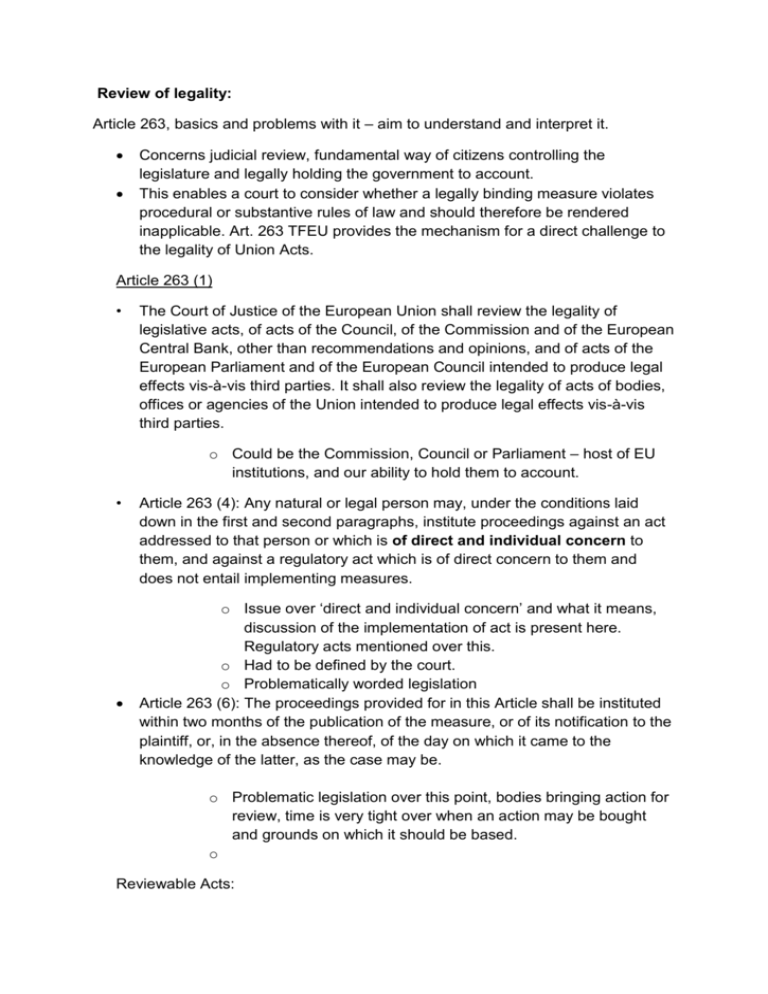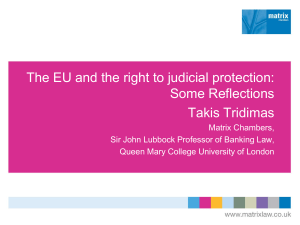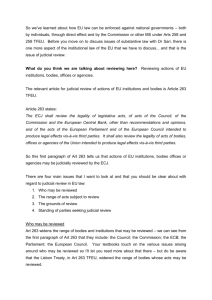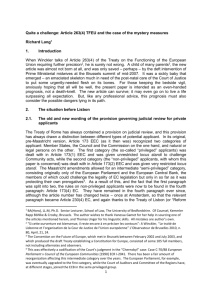Review of legality
advertisement

Review of legality: Article 263, basics and problems with it – aim to understand and interpret it. Concerns judicial review, fundamental way of citizens controlling the legislature and legally holding the government to account. This enables a court to consider whether a legally binding measure violates procedural or substantive rules of law and should therefore be rendered inapplicable. Art. 263 TFEU provides the mechanism for a direct challenge to the legality of Union Acts. Article 263 (1) • The Court of Justice of the European Union shall review the legality of legislative acts, of acts of the Council, of the Commission and of the European Central Bank, other than recommendations and opinions, and of acts of the European Parliament and of the European Council intended to produce legal effects vis-à-vis third parties. It shall also review the legality of acts of bodies, offices or agencies of the Union intended to produce legal effects vis-à-vis third parties. o Could be the Commission, Council or Parliament – host of EU institutions, and our ability to hold them to account. • Article 263 (4): Any natural or legal person may, under the conditions laid down in the first and second paragraphs, institute proceedings against an act addressed to that person or which is of direct and individual concern to them, and against a regulatory act which is of direct concern to them and does not entail implementing measures. o Issue over ‘direct and individual concern’ and what it means, discussion of the implementation of act is present here. Regulatory acts mentioned over this. o Had to be defined by the court. o Problematically worded legislation Article 263 (6): The proceedings provided for in this Article shall be instituted within two months of the publication of the measure, or of its notification to the plaintiff, or, in the absence thereof, of the day on which it came to the knowledge of the latter, as the case may be. o Problematic legislation over this point, bodies bringing action for review, time is very tight over when an action may be bought and grounds on which it should be based. o Reviewable Acts: 1. Legislative Acts 2. Regulatory Acts 3. Acts Regulatory bodies: • Inuit Tapiriit Kanatami and Others v European Parliament and Council (case T-18/10) – “…it must be held that the meaning of ‘regulatory act’ for the purposes of the fourth paragraph of Article 263 TFEU must be understood as covering all acts of general application apart from legislative acts. • Recent case, should read this post-Lisbon. About seal traders and a regulation which banned the profits over seal trading. • What does ‘all acts of general application apart from legislative acts’ mean? Means recommendations, opinions and resolutions. • Defined what an act was separate to these two categories. • In Inuit ‘acts’ were held by the ECJ to encompass any act addressed to a natural or legal person and any act whether legislative or regulatory, which is of direct and individual concern to them (including legislative and regualtory acts which require implementing measures). Reviewable acts must have some legal effects and consequence • Commission v Council (Re European Road Transport Agreement) (case 22/70) – Council resolutions may be ‘acts’ – The measure was a Council resolution setting out the position to be taken by the Council in the preparation of the road transport agreement. The Commission sought to challenge this resolution, since it considered the matter lay outside the Council’s sphere of competence. The action was declared admissible. – Broad interpretation of something having a legal effect, talking here about a memorandum of understanding and European road transport, legal effects must be pretty minimal. – Broad interpretation of what constitutes having a legal effect. Letters sent by the Commission (that are not decisions) can be reviewable ‘acts’. – Re Noordwijk’s Cement Accord (cases 8-11/66) – France v Commission (Re Pensions Fund Communication) (case C57/95) – Again, very, very, broad interpretation of what might cause a legal effect, interesting in this respect when contrasted to narrower legal positions. – Locus Standi – who may bring an action? – Privileged, Semi Privileged and Non Privileged – have different abilities to take their actions to court. • Broad Locus Standi ensures adequate control of the legislature • Narrow Locus Standi ensures that where an applicant is wholly unconnected they should not be able to challenge validity. As this would reduce legal certainty and affect the courts workload. • Privileged applicants can challenge any act they choose under Article 263, they do not have to prove individual concern: Member States, The Council, The Commission, The European Parliament. • Semi- privileged can bring an action under 263 if it affects their prerogatives in any way, they are confined to reviewing acts of institutions that are necessary for the protection of their prerogatives including, The Committee of the Regions, The Court of Auditors and The European Central Bank. • Non-privileged applicants is a natural or legal person is entitled to challenge an act addressed to that person, or which is of direct and individual concern to them and a regulatory act which is of direct concern to them and does not entail implementing measures. • Individual citizens have real problems challenging judicially. Direct Concern: • A measure will be of direct concern where it: – Directly affects the legal situation of the applicant – Leaves no discretion to the addressees of the measure – Who are entrusted with its implementation – For example say a measure was created measure because of position as an Exeter student, but is only addressed to one of you. Discretion of the addressee. – Hard-line approach to direct concern here. NV International Fruit Company v Commission (cases 41-44/70) • The Community adopted a regulation which affected the importation of apples during a set period of time. – The Commission decided to issue licences on the basis of information from MS’s about the previous weeks need for licences. Weird system. – “The measure whereby the Commission decides on the issues of the import licences thus directly affects the legal position of the parties concerned.” – Specific group that could be identified by the time limit here, could decide people were directly concerned here. In a municipality, Municipality of Differdange v Commission (Case 222/83) • Commission authorised Luxembourg to grant aid to steel firms as long as they reduced their capacity. The municipality argued direct concern due to a subsequent reduction of tax. – “It follows that the contested Decision left to the national authorities and undertakings concerned such a margin of discretion with regard to the manner of its implementation and in particular with regard to the choice of factories to be closed, that the Decision cannot be regarded as being of direct and individual concern to the municipalities with which the undertakings affected, by virtue of the location of their factories, are connected.” – Won’t have as much tax or money as other, challenged this in court over this – surely direct concern was applicable? – Another hard-line approach, even though they are directly affected by decisions outcomes, they won’t be directly concerned over ambiguities, in terms of direct concern this is semi-difficult to prove. Direct and individual concern. – WHOLE AREA DOESN’T MAKE LOGICAL SENSE, DON’T WORRY IF YOU DON’T UNDERSTAND THIS. Individual concern: o Previous legislation was willing to look beyond the form of the measure to its substance (was a regulation really a decision?) o Current legislation is more formalistic. o Regulation may state they’re going to stop all Apple Mac products being brought into this country, if only one person import this person, this could be seen as individual – regulation is addressed to one person. o Willing to go beyond previous regulation, current legislation is more formalistic. o Lisbon treaty made this worse. Individual Concern: • Plaumann & Co v Commission (Case 25/62) • The Commission refused the request of the German Government to suspend the collection of duties on clementine's. – “Persons other than those to whom a decision is addressed may only claim to be individually concerned if that decision affects them by reason of certain attributes which are peculiar to them or by reason of circumstances in which they are differentiated from all other persons and by virtue of these factors distinguishes them individually just as in the case of the person addressed. – In the present case the applicant is affected by the disputed Decision as an importer of clementines, that is to say, by reason of a commercial activity which may at any time be practiced by any person and is not therefore such as to distinguish the applicant in relation to the contested Decision as in the case of the addressee.” – Have to be able to prove you are as affected by this as the person the decision is addressed to. Decision affects Clementine seller, but you need to be able to distinguish yourself from anyone in this group, now and in the future. – Hugely hardline – terrible decision in terms of narrowness and restrictiveness. Should have a broad understanding of locus standi, puts decision on narrow focus. The Plaumann Test o Applicants can only be individually concerned by a decision addressed to another if they are differentiated from all other persons, and by reason of these distinguishing features singled out in the same way as the initial addressee. o The applicant failed because it practiced a commercial activity that could be carried out by any person at any time. o Such a difficult test to prove it essentially makes the claim redundant. Effectively still the leading case 50 years on, terrible case with huge amount of staying power. Problems with Plaumann: • Limited number of traders engaged in the activity, the fact that people ‘could’ do it doesn’t mean they will. Test is ridiculously narrow. • Only applies retrospectively because then groups can be defined. Only people in a single week can claim for example, but directives are never addressed to citizens over a week. • The test seems to be applied from some future ill-defined date rather than from the date the application was made. Open and closed categories o An open category is regarded as one where the membership is not fixed at the time of the decision. o A closed category is one in which it is fixed. o Ignores the practical realities of people joining groups. o Any decision with a future impact becomes unchallengeable. o Can’t ignore clementine sellers on a whim. Makes situation where any decision that has a future impact unchallengeable. o What kind of system can operate with judicial review unavailable to review over something that would have a future impact? o Basic Reading o Craig and De Burca, Chapter 14 o Recommended Reading o Plaumann & Co v Commission (Case 25/62) o NV International Fruit Company v Commission (cases 41-44/70) o Further Reading o Balthasar, S, ‘Locus Standi Rules for Challenges to Regulatory Acts by Private Applicants: the New Article 263(4) TFEU’ (2010) 35 ELRev 542 Critical analysis of Article 263 and how could it be changed? Individual Concern: Regulations and Directives • An applicant can claim to be individually concerned by a legal act that takes the form of a regulation or a directive – Calpak (cases 798-790/79) • A closed and definable group easily identified by the Commission. • Abstract terminology test, could this group potentially affect anyone using the abstract terminology test? Applicants could not show individual concern here, even though it was a closed and easily identifiable group they provided abstract test to prevent people from showing individual concerns. • Because the regulation used abstract terminology the applicants could not show individual concern. Codornui (Case C-309/89) • A Calpak ‘true regulation’ • Differentiated itself from all other traders due its trademarking of the word crémant (sparkling wine). – Liberalized Calpak but stayed true to Plaumann – Still very restrictive. – Stated because it revolved around particular trademarked word, it differentiated themselves from other traders. Other liberalized circumstances. Plaumann’s still the overriding case here, have to prove you’ve trademarked a word – high bar to set. – The Lisbon Treaty: The ECJ may well be reluctant to conclude that a provision termed a ‘legislative act’ will be of individual concern in the sense demanded by the Plaumann test. – An applicant may well face equal difficulties in convincing Union Courts that a delegated act in the form of a regulation or directive is of individual concern as judged by the rigorous requirements of the Plaumann test, given that delegated acts are defined as non-legislative acts of general application. – LIbson Treaty can be seen as a tacit approval of the way individual concern has been restricted; framers of treaty don’t see this as a problematic area – inference. – Did put in area of regulatory acts, unsure how this would work in practice – attempt to reinvigorate. – Continually problematic area however, ECJ has taken much more liberal approach in three key areas: Anti-dumping, Competition and State Aids. Total liberalization of these areas under 263 now. – Anti-dumping regulations prevent people outside the EU flooding the market with goods at low prices. Must be a regulation. Not a decision. Many more people can prove individual concern over anti-dumping rules therefore. – Timex (case 264/82) – the firm that initiated the complaint about dumping. Unhappy with the resulting regulation. Timex initiated complaint over dumping and were then unhappy with the results. Went ahead and created regulation to stop dumping – Allied Corporation (cases 239 & 275/82) – producers of the product subject to anti-dumping. – Producers and exporters charged with dumping would be individually concerned. – Can prove individual concern here, huge departure from Plaumann over anti-dumping. Extramet (case C-358/89) • Importer of the product against which the anti-dumping measure is imposed: A more lenient application of Plaumann? • Competition: Any natural or legal person who claimed to have a legitimate interest, could make an application to the Commission, putting forward evidence of a breach of Art’s. 101 & 102. Shown to have individual concern, decision never addressed to them showing individual concern – huge liberalization of issues. Much, much lower standard to apply in competition law. • Metro (case 26/76) - A competitor challenging a decision by the commission that was not addressed to them. State Aid: • Prevent competition from being distorted through government subsidies, giving it an unfair advantage over competitors. • COFAZ (Case 169/84) – analogous with Metro and Timex. Applicants have standing if their position on the market was significantly affected by the State Aid. • Very different to the way Ploughmann’s been interpreted, broad approach happening in some areas but not others, why should they be different. • Anti-dumping, competition law and state aid all have much more liberal approaches to individual concern. What is driving the liberal approach? • Cases tend to involve huge amounts of money, is this having a significant effect on the way we approach standing. • UPA (Case C-50/00 P) • Jégo-Quéré (Case C-263/02) - Reform considered in these cases over individual concern: UPA (Case C-50/00 P) Advocate General Jacobs – very important to read his opinion, usefully outlines all the problems with this area. o 102 (1) The Court's fundamental assumption that the possibility for an individual applicant to trigger a reference for a preliminary ruling provides full and effective judicial protection against general measures is open to serious objections: o Under the preliminary ruling procedure the applicant has no right to decide whether a reference is made, which measures are referred for review or what grounds of invalidity are raised and thus no right of access to the Court of Justice; on the other hand, the national court cannot itself grant the desired remedy to declare the general measure in issue invalid; o No guarantee there will be a referral to the ECJ, creating a real problem as the access to justice becomes trickier, and we cannot prove it on that route. Can’t necessarily rely on this from the national courts – difficulties with stating there’s complete protection for this judicial system. o If desperate you have to break the law, take this to the national court and they may refer it on to the ECJ! Madness. Idea of complete system of judicial protection is incorrect over this: o Legal certainty pleads in favour of allowing a general measure to be reviewed as soon as possible and not only after implementing measures have been adopted – have to break the law for 8 years. In the interest of legal certainty we need this to be as effective as possible. Locus standi doesn’t seem to be the way the courts dealt with this. o Indirect challenges to general measures through references on validity under Article 234 EC present a number of procedural disadvantages in comparison to direct challenges under Article 230 EC before the Court of First Instance as regards for example the participation of the institution(s) which adopted the measure, the delays and costs involved, the award of interim measures or the possibility of third party intervention. o Number of advantages of using 234 rather than 263 over the direction you can channel these with, risk of messing issues up. Should be effective over this, but there are issues with its methodology. • Solution presented? • (4) The only satisfactory solution is therefore to recognise that an applicant is individually concerned by a Community measure where the measure has, or is liable to have, a substantial adverse effect on his interests. That solution has the following advantages: – it resolves all the problems set out above: applicants are granted a true right of direct access to a court which can grant a remedy, cases of possible denial of justice are avoided, and judicial protection is improved in various ways; – it also removes the anomaly under the current case-law that the greater the number of persons affected, the less likely it is that effective judicial review is available; - what sort of system permits this? – the increasingly complex and unpredictable rules on standing are replaced by a much simpler test which would shift the emphasis in cases before the Community Courts from purely formal questions of admissibility to questions of substance; – Makes sense legal system should adopt this kind of system with the advantages of direct access to a court. Jégo-Quéré (Case C-263/02) o Court in the first instance followed UPA’s line of reasoning, but then the ECJ declined to recognise this following the opinion here – decision was to reject the model rejecting far-reaching proposals and continuing with the poor system. o Attempts at reforms are yet to hit the mark. The Plaumann test still applies here. Search Inuit on Westlaw for journal on this. o The term regulatory act does not fit easily with the Lisbon classification of legal acts. o Any legislative Act that does not have implementing measures? Or o Just regulations and decisions? o Plaumann test still applies. Inuit Tapiriit Kanatami, v European Parliament [2013] C-583/11 • The Court decided that regulatory acts in Article 263(4) do not include legislative acts. – The act under challenge in this case was EU Regulation 1007/2009 made by the EU Parliament and Council, and was therefore a legislative act and unchallengeable. • Contrast, an implementing regulation made by the Commission alone, filling in the details not dealt with in the primary Regulation, which could be challenged under Article 263(4) if of direct concern. • Limited number of acts that can be reviewed therefore, Article 263 thus becomes increasingly ineffective here; we’re forced in a system of reliance on Article 267. • Direct implementation of EU law here, by narrowing 263 to such an extent they have further reinforced idea of co-operation between national and EU courts? Problem question: A decision addressed to Aria has been made by the commission in order to control the amount of Pokémon Cards imported into the EU. Ryan is the only other importer of Pokémon Cards in the EU. He uses article 263 to challenge the legality of the act. As he is the only other importer he claims to be individually concerned. Advise Ryan. Plaumann case would be applicable here, although he’s the only distributor of Pokemon cards, anyone could join this group so it’s unlikely he’ll What case did Advocate say these things in? Decision should be a regulatory act over this. Act 263 applies, the decision can be reviewed. • Is this an Act? • Direct concern – Does it directly affect Ryan? – Does the measure leave discretion as to the addressees of the measure? • Individual concern – Differentiated from all other persons? (Plaumann) – Could anyone import Pokémon cards at any time? – Criticisms of the Plaumann test







